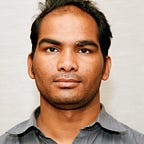![]() I grew up a nomad in Pakistan, part of a caste that was considered untouchable. I scavenged garbage, begged on the streets, and learned to read Urdu by picking up discarded school books that my mother, a housemaid, would bring me from the homes of rich kids in Lahore. Books soon became my weakness; I would rush to them as soon as she put the pile on ground.
I grew up a nomad in Pakistan, part of a caste that was considered untouchable. I scavenged garbage, begged on the streets, and learned to read Urdu by picking up discarded school books that my mother, a housemaid, would bring me from the homes of rich kids in Lahore. Books soon became my weakness; I would rush to them as soon as she put the pile on ground.
That was when, at about 13 years of age, I discovered Charles Dickens’ “Great Expectations,” which would change my life.
Dickens’ characters became my heroes. Most see his writing as social commentary that helped Victorian England understand poverty, but to me he provided hope. I pored over his books while sitting in our leaking tent, surrounded by the muffled snoring of my siblings. These heroes felt close to my heart, life, and background. Though I was growing up as a teenager on the street in 21st-century Pakistan, I could relate to 19th-century British literary heroes like Oliver Twist, David Copperfield, and Pip — we were all living in poverty amidst great wealth.
I still remember myself as a little, hungry garbage scavenger. I would eat whatever I found. Once, tempted by hunger, my older cousins tried to convince me to steal mangoes. Oliver Twist spoke to me from the pages to tell me that people can force me to do bad things, but nobody can make me a bad person: circumstances, hunger, or even bullying cousins cannot turn me into something I do not want to become. I always have a choice. I didn’t steal the mangoes — though I was still beaten by the owner, who thought I did, and again by the police. Even so, it was thanks to Dickens that I knew I could choose right over easy.
As the oldest of nine siblings, I had to help my parents feed my brothers and sisters. Life was especially hard for my mother, a brave woman who always felt the contempt and cruelty of the rich. Several times, she was labeled as a thief or loose character, which was hard for me to see. The situation reminded me of David Copperfield’s mother, who married a violent man after her husband’s death. But this ill treatment of his mother did not make David Copperfield a bitter person — and so I did my best not to treat others poorly, even when they were saying bad things about my beloved mother. Even when people thought that, because we were gypsies, our brains were not fit to read and write, I tried to show grace.
But more than any character, Pip, my hero, always stays with me. The greatest lesson I learned from “Great Expectations” was to believe in the beauty of my own dreams.
Just as Pip found a benefactor in Abel Magwitch, so did I, in the form of a U.S. Department of State official serving in Lahore. Thanks to the path she led me down, I now work with those who are considered the lowest of the low in Pakistan. My community organization, Slumabad, brings education to gypsy children and works to attain equal rights for gypsy and nomad communities.
My work is not easy; I’ve thought about giving often. Every time though, Pip would mysteriously appear and whisper into my heart, “Suffering has been stronger than all other teaching, and has taught me to understand what your heart used to be. I have been bent and broken, but — I hope — into a better shape.”
Now I am teaching these same lessons to children who are on the street picking garbage, driving their small herds of goats, sheep, and donkeys, and begging at traffic signals. These kids have similar childhoods to those of Dickens’ characters. Their homes sit atop garbage dumps and their families live in tents made of scraps of old clothes. They live without access to water, sanitation, or electricity. Their time in our school is the only time for them to feel the pleasure of learning, the joy of reading, and escape from their dismal reality.
Every day, when I start my classes, I can see my own childhood in their eyes. They tell me their stories and I hear Dickens’ tales against a Pakistani backdrop. I tell them that they are not the only ones to suffer in this way and that many Pips, Oliver Twists, and David Copperfields — my heroes — came before them. Reading Dickens not only connects us with these characters, it helps us see our role in leading the struggle for equal rights in Pakistani society.
When I teach children to read, I’m passing on the gift that Dickens gave me. His heroes gave me the power of dreams in an unjust and unequal world. They gave me identity in a society where you are judged by caste, religion, or family. His writing taught me to travel in my imagination to other cultures and times. Passing his legacy gives them extra armor to face hard times with dignity, character, and hope.
